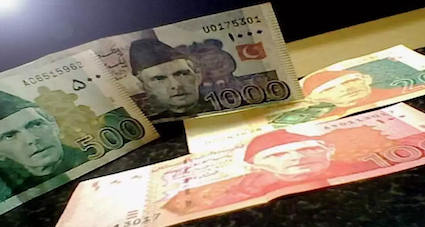Cash-strapped Pakistan’s currency fell to a record low of Rs 255.43 against the US dollar in the interbank market on Thursday. This came after the government relaxed its grip on the exchange rate to win much-needed loans from the International Monetary Fund (IMF).
Pakistan rupee plummeted by Rs 24.54 or 9.61 percent to Rs 255.43 from Wednesday’s market closure of Rs 230.89, according to the data of the State Bank of Pakistan.
The decline over 9 percent was its highest since October 30, 1999, when the currency had slid 9.4 percent.
Ismail Iqbal Securities’ Head of Research Fahad Rauf said, as quoted by Dawn newspaper, that it was the largest single-day decline in both absolute and percentage terms since the introduction of the new exchange rate system in 1999.
Meanwhile, British publication Financial Times has warned that Pakistan’s economy is at risk of collapse with the government’s “failure to revive” an IMF deal, Geo News reported.
As per reports, rolling blackouts and a severe shortage of foreign currency shortage are making it difficult for businesses to continue operations in the country.
Besides, shipping containers with imports are piling up at ports as the buyers are unable to secure the dollars to pay for them, Geo News added in its report.
UK newspaper said associations for airlines and foreign companies have warned that they have been blocked from repatriating dollars by capital controls imposed to protect dwindling foreign reserves.
“Officials said that factories such as textile manufacturers were closing or cutting hours to conserve energy and resources. The difficulties were compounded by a nationwide blackout on Monday that lasted more than 12 hours,” the UK newspaper reported.
Founder of Macro Economic Insights, Sakib Sherani claimed that already a lot of industries have closed down and if those industries are not revived soon, some of the losses will be permanent.
“Pakistan’s economic situation is “becoming untenable”, and maybe in a similar situation as Sri Lanka if the situation persists. If the “situation persists” then the country may default in May,” said analysts as reported by Financial Times.
Abid Hasan, a former advisor to the World Bank said, “Every day matters now. It’s simply not clear what the way out is. Even if they get a billion [dollars] or two to roll over, things are so bad that it’s going to be just a band-aid at best.”
Pakistan’s Planning Minister Ahsan Iqbal told the FT that Pakistan has “drastically” reduced imports to conserve dollars. “If we just comply with the IMF conditionalities, as they want, there will be riots in the streets. We need a staggered programme… The economy and society cannot absorb the shock or cost of a front-loaded programme,” Iqbal said as quoted by IANS.
After the devaluation of Pakistani’s currency in the open and interbank markets, the benchmark index of the Pakistan Stock Exchange (PSX) surged and gained by more than 1,000 points, reported Geo News.
Arif Habib Limited’s Head of Research, Tahir Abbas, said that the steep fall in the rupee has triggered a positive sentiment in the market. “The driving factor behind the market is the rupee’s market-based exchange rate. This has helped clear the uncertainty that was surrounding the investors,” Abbas said as quoted by Geo News.
The analyst further said that the government’s steps are helping the market to recover and increasing the confidence of the investors, who were in a fix due to the uncertainty over the revival of the IMF programme.
Abbas said that with a mini-budget expected within the next eight to 10 days, the gas and electricity tariffs might also witness an increase and more taxes might be imposed.


